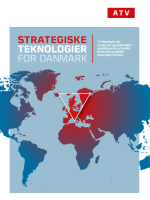On Prometheus and Paranoid Optimism – Israeli AI Lessons for the Nordic Region

The ATV Executive AI Network went to study the Israeli AI succes. Israel is facing many of the same issues that the Nordics are, but the difference is that the country is actively working on these. Two professors from the delegation went on to write this essay on the experience.
Israel, a land long known for religious pilgrimages, has as of late become something of a secular pilgrimage destination as well. Widely admired for the strength of their startup scene as well as for a very successful AI and software sector, Israel is a technology hotspot. With a population of only 9 million, Israel is claimed to have the greatest startup density per capita in the world, and their focus on data science and AI suggests this will continue. Israel is one of the world’s leading technology hot-spots in general and for data science and AI in particular, hosting more than 90 AI-focused R&D centers of global multinationals. Intel alone, who purchased Mobileye from the fertile tech-soil of Hebrew University for 15.3 BNUS, has 12,000 employees in Israel. In fact, Israeli AI-startups are so hot that they are attracting just shy of half of the entire available venture capital in the whole tech-sector.
What can the Nordics learn from this? Can e.g. the Öresund-region become something akin an AI Tel Aviv for northern Europe, if with less strife and worse hummus? We will contend that it can, but only if we pay attention to the real lessons Israel can teach us. Based on a recent study tour of the country’s AI-sector, arranged by ATV, we will here argue for what we see these to be.
When we, as professors (one at SDU, the other in Uppsala), teach our students on how to study technology and management we often come to talk about methodology – the manner in which we conduct research. Which are the phenomena to study and which comparisons actually work? Is it better to study very similar things, comparing robotics-companies with similar companies, or should we in fact see what robotics-companies can learn from a movie studio or a gaming collective?
The answer is that we can learn from both, and here the AI-sector in Israel offers us something rather unique – the opportunity to learn from something that is both quite similar, and at the same time radically different. A small country, without the endless resources of China or the USA, and yet starkly different both culturally and geo-politically.
Even if there might be limited opportunities for directly importing the Israeli way of AI, due to different societal context and structure, there are clearly some take-aways that are worth considering, particularly for small countries such as Denmark and Sweden. In the following we will first note on some of the specifics of the Israeli scene, and then what lessons that can be extrapolated from this.
Taking to AI Arms
The Finnish tech-entrepreneur Risto Siilasmaa, writing about the effort to transform Nokia after its ignominious fall from grace, coined the expression “paranoid optimism”. It is a curious turn of phrase, but works surprisingly well when trying to describe the overall mindset in many Israeli companies – and in part in society itself. Whilst the question of just how threatened the state is can be discussed, there is no getting away from the fact that it thinks it is under a permanent threat of complete annihilation. This can be socially and psychologically challenging, but it is also a source of great energy and dynamism. A nation that is focused by the perceived necessity to continuously update itself and remain vigilant will create systems to ensure such continuation.
Consider, for instance, the often mythologized Israeli army, and in particular a most curious part of the same – Unit 8200. As many know, all Israelis go through mandatory military service, currently three years for men and two for women. As current Western military doctrine relies heavily on monitoring, surveillance, and intelligence, it should not come as a surprise that many young men and women end up in military intelligence units. In fact, the best and the brightest of young Israelis are often sorted into such units – and if they are particularly brilliant they can try to get into Unit 8200. This odd unit, as part of the Intelligence Corps, is both an elite signals intelligence collecting agency and a powerful driver behind both the country’s startup miracle and the current successes in AI. In fact, a surprisingly high percentage of the people now trailblazing the Israeli push in AI all have a background in this one, obscure military unit.
Here the brightest and geekiest end up training in cybersecurity, coding, and advanced problem-solving with military discipline for three years, learning to utilize highly advanced technology. Here they also form often life-long bonds, and continue to the leading universities in the country, where they are also brought close to highly advanced entrepreneurship ecosystems. It is to this part of the military-university-industrial-entrepreneurial complex that we will next move, but not before some broader comments.
A specific unit cannot explain everything, but it is important to note it as a metaphor for the solution-centric mindset of Israel. Everyone is brought together to solve problems based on perceived existential threats. The narrative around solutions is also celebrated, with entrepreneurial success being seen as not just important for the individual entrepreneur, but for the country as a whole. Paranoia combined with an optimism around solutions – it is a heady mix.

Trojansk hest af gamle computere står foran militærakademiet i Tel Aviv
Feeding the Next Unicorn
If the military context of Israel is markedly different from that of the Nordics, something similar can be said for early-stage entrepreneurial funding, particularly in a university context. The Israeli AI innovation ecosystem is powered by substantial early seed money funds, including ones owned in full or in part by the universities themselves. Having 70 million dollars or more to spend on seed money (0,5 - 1 million dollars), provides financial muscles unheard of by most Danish or Swedish universities. In a similar fashion, many of the biggest international venture capital firms and private equity companies have been very keen to engage with the startup scene in Israel, an interest that has only increased with the current AI boom.
Here, some might wish to remind us that countries like Denmark and Sweden actually rank very well among the most innovative companies in the world, and that the Nordic countries actually have overperformed when it comes to startup entrepreneurship. They might also push back against the notion that money would be all that important, as we’ve become used to the tale of a great company being started by two college dropouts with nothing but a laptop and a dream. Whilst we would agree with the fact that money isn’t everything, these criticism misses the mark and points to an issue that Israel has understood and the Nordics are still trying to figure out.
Simply put, AI is surprisingly expensive. Not in and of itself, but the business of creating the next great AI company is far more challenging than the evangelists of machine learning make it out to be. Whilst we say that data is everywhere, it is still quite unevenly distributed. Getting the right datasets can be very costly, and as more and more organizations understand the value of data, prices are going up. Getting the right talents – young, energetic people who understand programming and have an insight into data science – is already a problem even in Israel, even with an actual military unit specialized in enriching the country with exactly such. Finding and hiring proper data scientists is getting so costly that many startups simply cannot afford them, to the detriment of the nation, and let us not even discuss the potential costs of competing in a world with quantum computing, the economics of which is still unknown.
Israel has solved some of these issues with the help of both the military and the universities, not to mention the startup economy itself – the robotics lab of Tel Aviv University is housed in a large building donated by a successful tech entrepreneur. That said, they are also seeing that these are issues that are only getting more acute and which will need a lot of attention in the future.
Learning from Israel
The coming AI challenge might be outlined by paraphrasing the 1980’s crooner Billy Ocean, more precisely his hit from 1988 ”Get Outta My Dreams, Get into My Car”. AI is of course well underway to get into our cars, but how do we get AI out of pure data science and into science and engineering? How do we get AI to augment research and development in traditional fields on a broader scale? How do we get AI to become a universal tool? Inspiring beachheads are of course already here – AI-powered R&D in medical diagnostics, drug-discovery, battery chemistry and so on. However, most fields of advanced technology management have yet to fully incorporate AI as a go-to technology, and rest assured, whoever stays ahead in this race will reap most of the rewards. Regardless of whether you are in business or in academic research, getting AI into your everyday work with processes and products will be a herculean effort, yet one with promethean potential.
What Israel shows us are the challenges ahead. One is a chronic lack of data scientists, and how our universities are not coping with the rising demand. Secondly, university education is notoriously slow to change, and while actual change may be dramatic in these areas, curricula change as slowly as ever. A lot of AI state-of-the-art skills and techniques are better (or only) taught by industry than by our universities. Thirdly, data science is not enough, so a deep understanding of science and engineering challenges are a must as well. We need engineers who understand data science just like we need data scientists who understand engineering – in talents young and old, upgrading both our educational systems and our overall workforce.
Israel is facing many of the same issues that the Nordics are, but the difference is that the country is actively working on these, whereas many of the Nordic countries are caught up in a technological somnambulism. Israel’s paranoid optimism shows the necessity of crisis mindset for dealing with emergent technologies, whereas their robust entrepreneurial finance shows and understanding of just how much a transition to the AI economy might cost. Yes, Israel too is lacking in the amount of data scientists on hand, but our trip made it clear that they are far more aware of the challenge than the Nordics – and in particular the Nordic universities – are.
What Is To Be Done, or, Whither Prometheus?
Both of us are academics, which tends to mean that we are more focused on what has been than what will be. That said, we want to suggest a few ideas for shaking the Nordics out of their slumber, bringing forth a little bit of the fire of Prometheus to the nascent AI field in the region.
To start, what about learning from Unit 8200? Why not try to get the brightest and the geekiest of Nordic youth together to foster their creative capacity without the straightjacket of our sluggish and mainstreaming curricula? Why not make AI and data science mandatory for all university students, no matter if they study Aramaic or nano-technology?
To continue, we need to make it clear to the Nordics that the one-two punch of AI and quantum computing may well be the kind of thing that shatters our current self-congratulatory beliefs of our permanent success. We need to import a little bit of the paranoia and vigilance that Israel has – not in the military sense, but to make us less self-satisfied and lazy.
To finish, we need to realize that whilst the rise of the internet economy was one where very limited resources could create outsize value, this isn’t necessarily the way the AI economy will develop. On the contrary, we still don’t know the exact shape of AI economics, and need to be prepared for some bumpy roads ahead. The costs of training data scientists and accessing the right kind of big data might make us balk, but the value that we might create could well eclipse even oversize investments in the here and now.
Does Israel have all the answers? No, of course not. But they suggest a number of highly interesting challenges to the currently moribund attitude towards AI in the Nordics, and these are challenges we ignore at our peril. Prometheus is rising again, and we need to catch the fire.
Professor Marcus Lindahl, Uppsala University & professor Alf Rehn, University og Southern Denmark (SDU). May, 2022.





